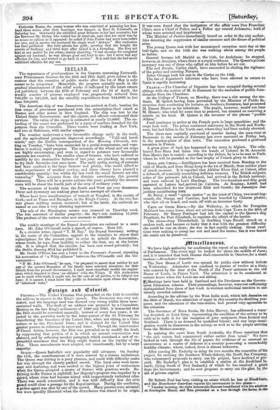_foreign anti Colonial.
Paussia.—The United Prussian Diet proceeded on the 15th to consider the address in answer to the King's speech. The discussion was very ani- mated; and the language used was deemed very strong within those unac- customed walls. The draft of an address was prepared by a Committee. Heating on the late King's ordinances of 1820 and 1823, it demanded that the Diet should be convoked annually, instead of every four years; it ob- jected to the provision made by the letter-patent of the 3d February for transferring the functions of the United Diet, when not sitting, to a Com- mittee, or to the Provincial Diets; and it claimed for the United Diet greater powers in reference to taxes and loans. Through the intervention
Count Arnim, however, the Diet was prevailed on to modify the draft, by suppressing that portion of it in which an annual convocation .was claimed; and by softening another paragraph which contained "a sort of re- proachful assurance that the King might depend on the loyalty of the Diet. These amendments were adopted, not unanimously, but by a large Majority.
Sranr.—Queen Isabella% new popularity still' advances. On Sunday the 11th, the manifestations of it were marred by a riotous turbulence. The Queen was driving in a pony phaeton, and could, with, difficulty make her way through the closely-packed crowd. The loyal cries were inces- sant and deafening, and were excited to the highest point of enthusiasm when the Queen accepted a crown of flowers with gracious words: Re- turning to the Palace at nightfall, her Majesty's progress was impeded by a- Crowd, whose vivas had become mixed with inopportunely turbulent cries. There was much commotion, and it was with difficulty that the civic guard could clear a passage for the Royaloarriage. During the confusion, a police-agent was shot by one of the crowd. Many perskais were arrested; but were speedily liberated when the disturbance was teaced to its origin.
It was soon found that the instigators of the affair were Don Francisco Chico, once a Chief of Police, and a Police spy named Aviraneta; both of whom were arrested and imprisoned: The Minister of Justice immediately issued an order to the city author- ities directing the suppression of similar excesses and the disuse of political cries.
The young Queen met with her accustomed reception next day at the bull-fight; and on the 15th she was walking about among the people as before.
General Serrano left Madrid on the 11th, for Andalusia: he stopped, however, at Aranjuez, where there is a royal residence. The Queen's private secretary was one of those who called on him before he set out.
Elio and Zavala, Carlist chiefs, have succeeded in eluding the vigilance of the police and entering Navarre. Seilor Olozaga took his seat in the Cortes on the 15th.
The list of Espartero's followers who have been allowed to return to Spain is rapidly increasing.
FammE.—The Chamber of Deputies has been occupied during several sittings with the motion of M. de Remusat for the exclusion of public func- tionaries from the Chambers.
At the College of France, on Monday, there was a riot among the stu- dents. M. Quinet having been prevented by the Minister of Public In- struction from continuing his lectures on Southern literature, had presented M. Dames Hinart as his substitute: The pupils, however, would not hear M. Hinart; who tried for some time to proceed; but desisted on receiving a missile on his head. M. (ballet is the inventor of the phrase "perfide Albion."
Food continues to arrive at the French ports in large quantities • and the crops look well. The prices continued stationary in the North and North- west, but had fallen in the North-east,.where they had been unduly elevated.
The three men capitally convicted of murder during the corn-riots at Buzencais in the month of February last were executed on Friday last,. in the market-place of that town. The execution produced a profound sensation in France.
A great piece of luck has happened to the army in Algiers. The cele- brated Bou-Maza had fallen into the hands of Colonel de St. Arnauld. Bou-Maza's fate is sealed: according to the .Debate, he is to be sent to Paris, where he will be paraded as the last trophy of French glory in Africa.
Tenn ATM Cm/ca.—Intelligence has been received from Bombay to the' 15th of March, and from Hong-kong to the 1st of March; from neither place of much moment. It is reported that Akhbar Khan died, at Cabool, after a debauch, of a malady resembling delirium tremens. The British subjects, relics of the prisoners left in Cabool, had arrived in the British territory, and were relieved by Lord Hardinge. The two-hundred-and-fifty guns captured at Lahore had.arrived at Calcutta. At Bombay, 3,0001. had been subscribed for the distressed Irish and Scotch; Sir Jamsetjee Jee- jeebhoy contributing 5001.
At Amoy, a small "opium station " on the coast of China. tworeoeiving- vessels, the Omega and Caroline, had been boarded by Chinese pirates; who slew all on board, and made off with an immense booty.
CAPE OF GooD HOPE.—By the Wellesley, in which Sir Peregrine Maitland has come home, there are advices from Cape Town to the 20th of February. Sir Henry Pottinger had left the capital in the Queen's ship President, for Port Elizabeth, to regulate the affairs of the border.
The steam-sloop Thunderbolt, in doubling Cape Receif, struck on a sunken rock, and became so leaky that it was with the greatest difficulty she could be ran on shore; she was in fact rapidly sinking. Great exer- tions were making to pump her out and land the stores; but it was feared she could not be preserved.


























 Previous page
Previous page